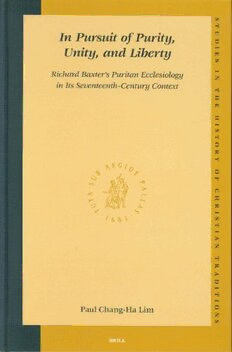
In Pursuit of Purity, Unity, and Liberty: Richard Baxter's Puritan Ecclesiology in Its Seventeenth-Century Context (Studies in the History of Christian Thought) PDF
285 Pages·2004·1.356 MB·English
Most books are stored in the elastic cloud where traffic is expensive. For this reason, we have a limit on daily download.
Preview In Pursuit of Purity, Unity, and Liberty: Richard Baxter's Puritan Ecclesiology in Its Seventeenth-Century Context (Studies in the History of Christian Thought)
Description:
Richard Baxter's ecclesiology is the focus of this study. Arguably one of the best-known Puritans of the seventeenth century, Baxter (1615-1691) lived through the British Civil Wars, the Regicide, the Interregnum, the restoration of monarchy and episcopacy in 1660, subsequent ejection of numerous Puritan pastors, and the Glorious Revolution of 1689. His ecclesiology was formed within these multifarious contexts. Among others, three significant facets of purity, unity, and liberty are examined in detail. The book re-examines the central role of catechizing and congregational discipline in Baxter's understanding of the true church, his insistence that the purity and unity of the church are to be pursued concurrently, the self-perceived identity of English Puritans, and the question of the true church in the latter-half of the seventeenth century.
See more
The list of books you might like
Most books are stored in the elastic cloud where traffic is expensive. For this reason, we have a limit on daily download.
